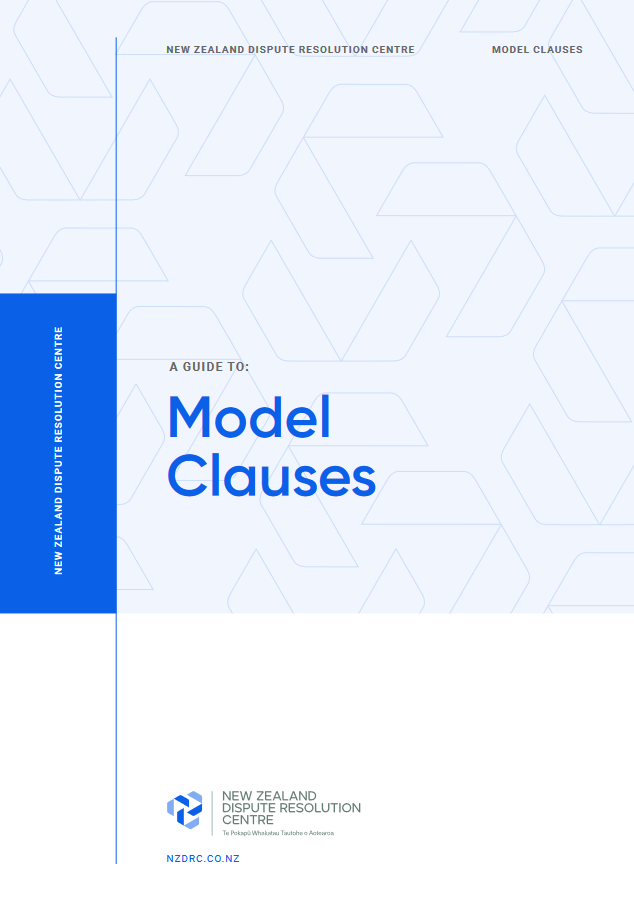Model clause: Arbitration
Having a clear, certain and well-drafted model clause is essential to ensure effective and efficient dispute resolution should the need arise.

On this page
Overview
There are two options available to parties depending on whether they wish any arbitration to proceed on an ad hoc basis under the Arbitration Act 1996 or under the NZDRC Arbitration Rules.
Model clause for future disputes (NZDRC Arbitration Rules)
Looking for a clause to insert in your next contract? Use our model clause to access to the most proportionate arbitration process should a dispute arise in the future.
Model clause for future disputes (ad hoc)
Prefer an ad hoc arbitration process? Use this model clause to access ad hoc arbitration in the future.
Existing disputes
Parties to an existing dispute can still agree to refer it to arbitration, whether under the NZDRC Arbitration Rules or as an ad hoc arbitration under the Arbitration Act 1996. Request a template arbitration agreement.
Overview
The settlement of disputes by arbitration is an important feature of the domestic commercial and legal landscape.
The primary objective of modern commercial arbitration is the fair, prompt, and cost-effective determination of any dispute in a manner that is proportionate to the amounts in dispute and the complexity of the issues involved.
NZDRC recommends parties to contracts include a model arbitration clause to ensure they can access arbitration as a dispute resolution option of choice without delay should a dispute arise between them.
There are two options available to parties depending on whether they wish any arbitration to proceed on an ad hoc basis under the Arbitration Act 1996 or under the NZDRC Arbitration Rules.
Arbitration under the NZDRC Arbitration Rules ensures that any dispute is automatically filtered into the most proportionate arbitration process based on the value of the dispute (the parties can always agree on another process, but the default is the most proportionate option in terms of time and cost):
Value of dispute | Default Rules | Key Features |
|---|---|---|
$2.5M or greater | Standard Arbitration Rules | Timetable to be agreed by the parties or determined by the arbitral tribunal Hearing, unless parties agree otherwise |
$1M up to $2.5M | ECA90 Arbitration Rules | 90 working days to an award 5 working day hearing, unless parties agree otherwise |
$250K up to $1M | ECA60 Arbitration Rules | 60 working days to an award 3 working day hearing, unless parties agree otherwise |
Up to $250k or declaratory relief | ECA45 Arbitration Rules | Documents only Fixed fee service available 45 working days to an award |
Model clause for arbitration under the NZDRC Arbitration Rules
The following clause should be included in contracts where the parties wish to have any future disputes resolved by arbitration under the New Zealand Dispute Resolution Centre’s Arbitration Rules:
“Any dispute or difference arising out of or in connection with this contract, or the subject matter of this contract, including any question about its existence, validity or termination, shall be referred to and finally resolved by arbitration in accordance with the Arbitration Rules of the New Zealand Dispute Resolution Centre.”

Model clause for ad hoc arbitration under the Arbitration Act 1996
The following arbitration clause should be included in contracts where the parties wish to have any future disputes resolved by arbitration under the Arbitration Act 1996:
“Any dispute or difference arising out of or in connection with this contract, or the subject matter of this contract, including any question about its existence, validity or termination, shall be referred to and finally resolved by arbitration in accordance with the Arbitration Act 1996. The arbitral tribunal shall be appointed from the panel of arbitrators maintained by the New Zealand Dispute Resolution Centre and, in the event the parties are unable to agree on the composition of the arbitral tribunal within seven days of written notice of the dispute being given, the arbitral tribunal shall be appointed by the New Zealand Dispute Resolution Centre upon application by any party to this agreement.

The number of arbitrators shall be one. [or may choose three]
The language to be used in the Arbitration shall be English. [or choose another language]
The governing law of the contract shall be the substantive law of New Zealand. [or choose another country]”
Got an existing dispute?
Parties to an existing dispute that have not incorporated an NZDRC Model Arbitration Clause into a prior agreement may still agree to refer that dispute to arbitration under the NZDRC Arbitration Rules or as an ad hoc arbitration under the Arbitration Act 1996 by signing an agreement to refer their dispute to arbitration.
Complete the form below, and our registry team will send you an agreement to use:
Request for template arbitration agreement
Other resources you might like

Arbitration
The primary objective of modern commercial arbitration is the fair, prompt, and cost-effective determination of any dispute, in a manner that is proportionate to the amounts in dispute and the complexity of the issues involved.

More Model Clause Options
Access our complete guide to model clauses for all our process options.

Clause and effect: the importance of well-drafted model clauses
An overview of why well-drafted model clauses matter.